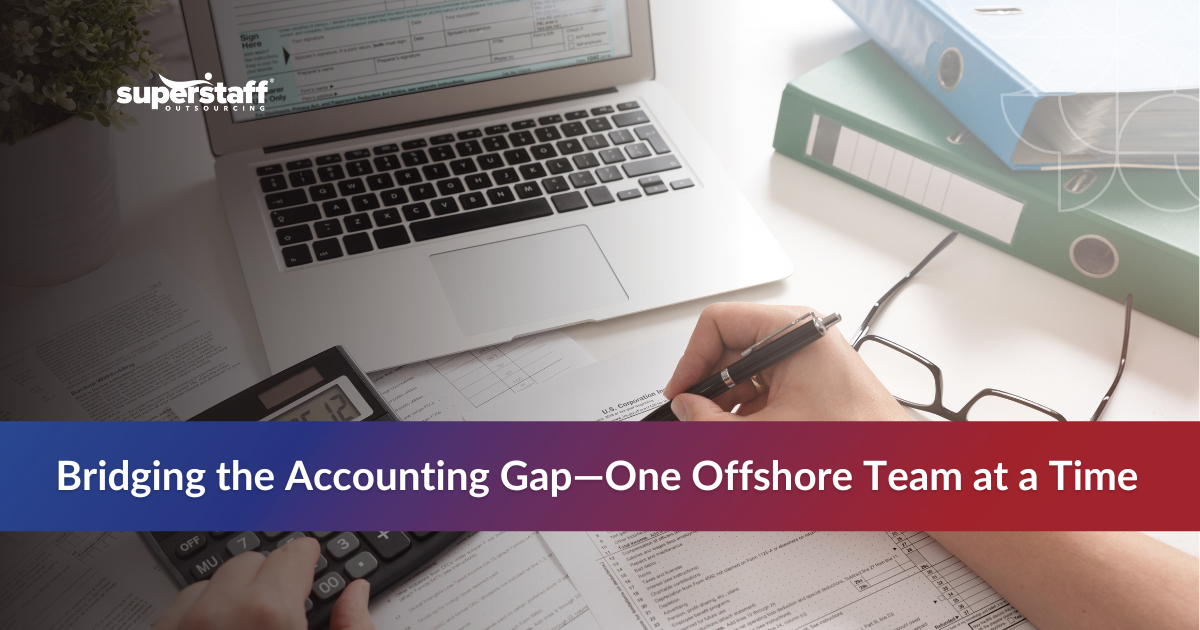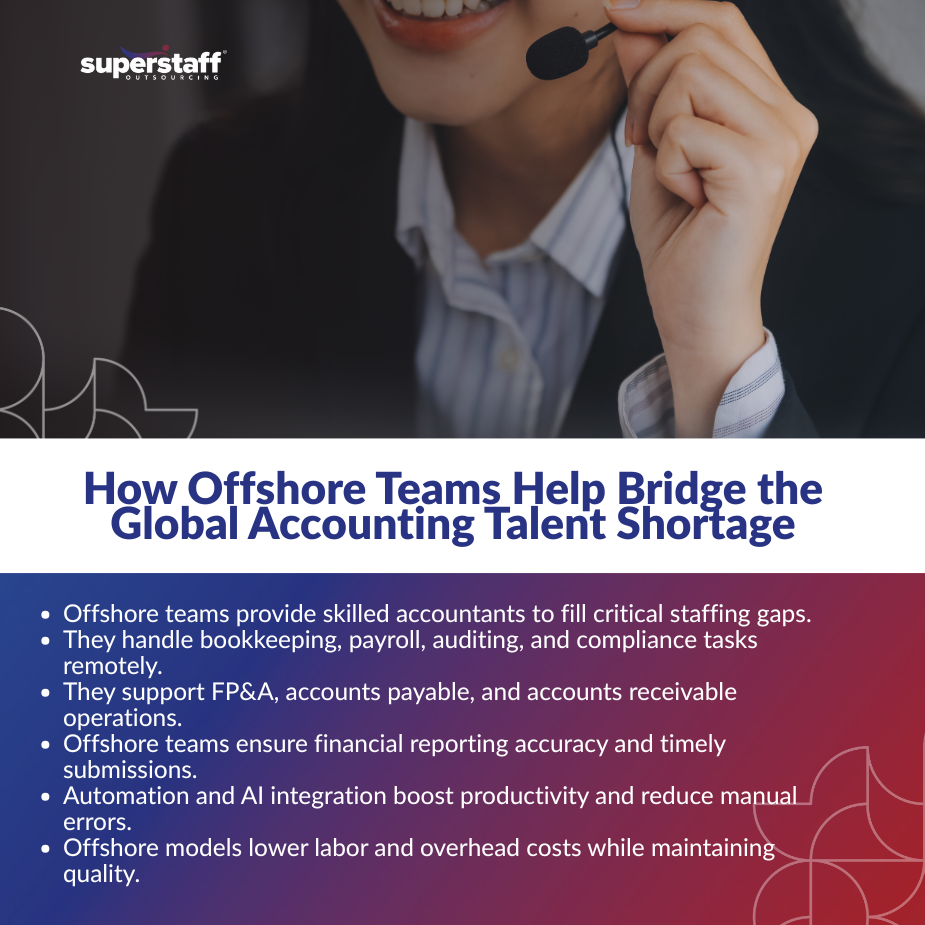
The global accounting talent shortage has become one of the most pressing challenges for businesses today. In the U.S. alone, firms are struggling to fill open finance roles as the number of qualified accountants continues to decline. Across major economies, aging workforces, evolving education priorities, and burnout-driven turnover are shrinking the pool of skilled professionals just as financial operations grow more complex.
This imbalance has left many organizations at risk—unable to meet compliance requirements, maintain reporting accuracy, or sustain efficient financial management. Yet amid this talent drought, one country has emerged as a reliable, long-term solution: the Philippines.
With its strong accounting education system, globally recognized professionals, and cultural compatibility with Western businesses, the Philippines offers a scalable workforce ready to support companies facing domestic shortages. Offshore accounting teams based in the country are helping organizations manage their books, streamline reporting, and enhance financial accuracy, all while keeping costs under control.
As the accounting talent gap continues to widen, building offshore teams in the Philippines isn’t just a temporary fix; it’s a strategic step toward ensuring financial stability and growth in a world short on numbers but long on opportunity.
The Global Accounting Talent Crisis: What’s Driving the Shortage
The accounting talent shortage is no longer a looming threat; it’s a global reality. In the U.S., thousands of firms face difficulty finding qualified accountants, auditors, and tax professionals. The same pattern is unfolding across Europe, Australia, and other major economies where the supply of skilled finance professionals has steadily declined.
A major contributor to this shortage is the declining enrollment in accounting programs. Fewer students are pursuing careers in accounting due to the perception that the field lacks creativity and work-life balance. According to the American Institute of CPAs (AICPA), the number of new CPA exam candidates has dropped by nearly 30% in the past decade. Universities are reporting similar declines, leaving firms without the next generation of talent they desperately need.
Meanwhile, burnout and early retirements are accelerating the gap. Many CPAs who managed complex compliance and audit tasks during the pandemic are exiting the profession early due to stress, workload, and stagnant compensation. Firms are losing institutional knowledge faster than they can replace it.
The shortage is compounded by rising compliance and technology demands. As financial systems evolve, accountants must master new tools like data analytics platforms, ERP systems, and AI-driven software—skills not all professionals possess. The demand for “tech-enabled accountants” far exceeds the number of professionals qualified to fill these hybrid roles.
As the gap widens, companies are recognizing that traditional recruitment strategies no longer suffice. The search for solutions has prompted a growing number of firms to explore outsourcing for CPA firms, tapping into global talent pools to sustain financial operations and compliance continuity.
As the talent gap widens, businesses are rethinking how to fill these critical roles—and many are turning their eyes toward the Philippines.

Why the Philippines Has Emerged as a Premier Offshore Accounting Destination
When it comes to overcoming the accounting talent shortage, few countries have proven as dependable as the Philippines. The nation’s strong academic infrastructure, cultural compatibility, and English fluency have made it a global hub for outsourced financial services.
The country produces thousands of CPA and accounting graduates annually from top-tier universities such as De La Salle University, the University of the Philippines, and Ateneo de Manila University. These graduates are trained in international accounting standards like IFRS, giving them the technical and ethical grounding to work seamlessly with U.S., Australian, and European firms.
Moreover, the Westernized business culture in the Philippines ensures alignment in communication style, professionalism, and work ethic. Filipino accountants are not just technically skilled—they understand global client expectations. Combined with time zone flexibility, they can support operations across North America and Europe in real time.
The Philippine government also actively supports the BPO and KPO sectors, creating policies that encourage the export of high-value professional services like accounting and finance. This ecosystem provides the infrastructure and incentives that make the country an ideal destination for offshore teams for accountants.
With the right offshore partner, businesses can leverage this ecosystem to overcome domestic talent shortages and operational bottlenecks.
How Offshore Accounting Teams Bridge the Talent Gap
Outsourcing is no longer just about cutting costs; it’s about continuity and capability. Offshore accounting teams from the Philippines integrate seamlessly into corporate finance structures, performing essential and strategic functions alike.
They handle bookkeeping, payroll, and audit preparation remotely, ensuring accuracy and compliance across all financial records. Beyond basic accounting, these teams support financial planning and analysis (FP&A), accounts payable/receivable, and reconciliation tasks, allowing in-house teams to focus on strategic decision-making.
Their value goes beyond operational tasks. Offshore accountants contribute to financial reporting accuracy, ensuring adherence to global standards while reducing the risk of noncompliance. They serve as an extension of in-house departments, equipped to deliver results that meet or exceed domestic standards.
These offshore solutions don’t just fill roles—they strengthen a company’s entire financial backbone.
The Technology Advantage: Leveraging Cloud Accounting and Automation
Modern finance is digital, and how offshore accounting teams in the Philippines solve the global accounting talent shortage lies partly in their technological agility. Filipino accountants are trained and certified in using popular cloud-based accounting tools like QuickBooks, Xero, NetSuite, and FreshBooks.
This tech fluency extends to AI-assisted reconciliation, financial forecasting, and data analytics integration. By leveraging automation, these teams handle high-volume tasks faster, with fewer errors, while maintaining complete visibility for clients. Cloud technology allows real-time data sharing and collaboration, making offshore integration as seamless as working with an in-house team.
This capability is particularly beneficial for outsourcing for CPA firms, where accuracy, timeliness, and audit readiness are critical. The ability to harness advanced accounting software ensures consistency across global operations while enabling clients to scale rapidly.
Beyond cost and efficiency, this technological adaptability ensures transparency, accuracy, and long-term operational trust.
Cost Efficiency Without Compromise on Quality
One of the most compelling reasons companies turn to offshore teams for accountants is cost efficiency. Yet, the savings go far beyond payroll.
The average salary of an accountant in the Philippines is significantly lower than in the U.S., even when factoring in competitive benefits and performance incentives. Companies can save on labor costs without sacrificing quality or compliance. These savings extend to recruitment, onboarding, and infrastructure, as the offshore provider handles HR, training, and workspace management.
What’s more, quality remains uncompromised. Top Philippine BPO firms invest heavily in robust training programs and performance metrics, ensuring that offshore accountants stay updated on international standards and best practices. With strong management oversight and client collaboration, service quality meets or even surpasses in-house performance benchmarks.
But offshore accounting is about more than just lowering costs—it’s about building enduring financial capability and flexibility.
Overcoming Common Misconceptions About Offshore Accounting
Despite the clear advantages, misconceptions about offshore teams for accountants persist. Concerns about data security, communication, and control are common among firms new to outsourcing.
However, reputable BPO partners in the Philippines implement secure data transmission protocols such as end-to-end encryption, VPN protection, and compliance with GDPR and SOC 2 standards. This ensures that financial information remains protected and confidential.
Transparent workflows and performance tracking dashboards keep clients updated on progress and deliverables in real time. Communication barriers are virtually eliminated through collaboration tools like Slack, Zoom, and Microsoft Teams, while aligned working hours ensure accessibility.
These safeguards enable firms to retain full visibility and control over their offshore operations—proving that distance doesn’t have to mean disconnect.
Once these misconceptions are addressed, companies can confidently embrace offshoring as a strategic advantage.
Building a Strong Partnership With Your Offshore Provider
Success in outsourcing for CPA firms depends on strong collaboration. Building a partnership—not just a vendor relationship—ensures both parties align on goals, quality standards, and performance outcomes.
The foundation starts with clear KPIs and communication protocols. Firms should define turnaround times, reporting structures, and performance metrics. Cultural onboarding is equally essential; introducing offshore accountants to company values, systems, and workflows fosters integration and trust.
Continuous training and feedback loops also play a key role in sustaining quality. Leading Philippine BPOs invest in professional development, ensuring teams stay ahead of regulatory and technological changes.
When companies treat their offshore accounting teams as strategic partners rather than contractors, they unlock deeper collaboration, innovation, and retention.
A well-structured partnership ensures not just talent access, but long-term organizational synergy.
The Strategic Future of Offshore Accounting
The future of accounting will be shaped by data, automation, and global collaboration—and the Philippines is positioned at the center of this transformation. Offshore accountants are increasingly taking on strategic roles, from financial analytics to risk management, helping organizations make smarter, data-driven decisions.
As AI and automation tools become more integrated, offshore professionals will complement these systems, focusing on interpretation, insight, and advisory work. Filipino accountants’ adaptability and analytical skills will make them indispensable in this data-driven financial era.
The accounting talent shortage will continue to pressure global markets, but forward-thinking companies that adopt offshoring early will maintain stability, scalability, and competitive advantage. The trend is clear: offshore teams are evolving from transactional support to strategic contributors in business transformation.
These developments signal a global shift—from viewing outsourcing as a stopgap to recognizing it as a long-term value driver.
Overcome the Accounting Talent Shortage Through Offshore Financial Service Outsourcing
The accounting talent shortage has redefined how businesses approach financial management. With traditional hiring pipelines shrinking and workload demands growing, companies need sustainable ways to maintain accuracy, compliance, and agility.
How offshore accounting teams in the Philippines solve the global accounting talent shortage is through a blend of education, technology, and cultural compatibility. These teams bring the expertise, reliability, and scalability that businesses require to operate confidently amid talent constraints.
From outsourcing for CPA firms to building dedicated offshore teams for accountants, the Philippines provides a proven pathway to bridge global skill gaps while improving operational efficiency and cost control.
To stay competitive in a tightening talent market, businesses must act now. Partner with a trusted outsourcing provider like SuperStaff to build a high-performing, future-ready accounting team that ensures accuracy, scalability, and strategic growth—no matter where the global talent tide shifts.
Contact us today to learn more about our outsourced accounting and bookkeeping services.






